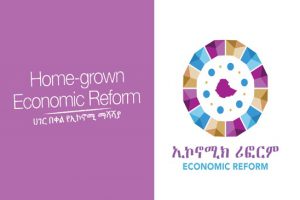ADDIS ABABA – The Catholic Relief Services announced that it has been working actively to combat the spread of COVID-19 through allocating 5.5 million Birr budget.
The services have benefitted over 300 thousand people, it added.
Zemede Abebe, coordinator of the organization said that to combat the pandemic the organization has been providing food and nonfood related items, medical supplies, sanitizer and similar hygiene products to curb the spread of the pandemic.
Equally, the organization has been undertaking different awareness creations via various communication channels to mitigate the virus. It has also donated different medical equipment like digital and infrared thermometer for 28 health centers to fight against the virus.
He underscored that the organization distributed 25 different types of materials for three terms and it will continue to provide its contribution until the virus is mitigated.
The Ethiopian Herald May 21/2020
TAMERU REGASA
State sustains efforts to prevent desert locust swarm
ADDIS ABABA– Gambela state announced that it has finalized preparation to fight against the swarm of desert locust and set preventive strategies to minimize disaster which could happen.
Doctor Lu Obup, States Agriculture and Natural Resource Bureau Head told The Ethiopian Press Agency that the invasion of the pest has first been spotted at the beginning of May in Dima and then Mesung Zone.
The Head has also said that the swarm has become a threat in Musing Zone while in Dima the pest has retreated following farmers sound-based protective measures.
Indicating that the swarm caused substantial damage upon crop production in Musung zone, he said the State Bureau is working with the Ministry of Agriculture to tackle the unprecedented further threat.
Having realized the impacts of the desert pest at four maize farms, alarming signals, and works of sensitizing the community at zonal and woreda have been taken as one of the priority agendas of the time.
As the swarm needs the intervention of the federal government, initiation has already been started to use Airplanes and Helicopters, he said.
It was also indicated that the local professionals are discharging their responsibility in fighting the distractive immigrant pest, yet the state further needs comprehensive assistance of the federal government like supplying technique, logistics assistance, and allocating funds.
At the same time the state’s senior officials including the chief of the state have closely been following the situation visiting and observing districts where the invasive pest has been spotted.
According to experts the swarm is currently moving scattered. Hence, the state is ready to prevent the main swarm which would likely invade and thereby tackle the disaster on Agri fields and food security of the state.
Most notably, an integrated communication network has been launched in all administrative units from zonal to lower administrative units across the region to swift the preventive measure to tackle the possibility of the catastrophes particularly in the most exposed districts, it was stated.
The Ethiopian Herald May 21/2020
BY LAKACHEW AITINAFU
Bureau unveils risk of COVID-19 spread in Harar
Harere State Health Bureau revealed that the daily entrance of some 2o to 30 thousand travelers to the town of Harar via the six gates has provoked fear in relation to accelerating the rate of COVID-19 spread.
Redwan Mohamed, States Health Bureau Communication Director told The Ethiopian Press Agency that travelers from abroad transit through Togochale, Somali Land, and passengers from Diredawa destining Harar triggers hazards for the blow out of the disease in the town.
Redwan said that there are ten thousands of people entering the town of Harar through the main gate Hamaresa and the six gates of the historic city.
Indicating that sensitizing the public is the principal preventive stratagem that gains due concern of officials, he said adding that preventive directives and information have been disseminated using local media of the region and door to door campaign to enhance the disastrous impact of the pandemic among the public.
Efforts have been orchestrated to make applicable alerting messages conveyed across the public with the integrated commitment and determinations of religious leaders’ influential people and youth volunteers.
According to the director, the reluctance of the people to maintain social distancing at markets appeared to be the potential threat to the likelihood of fatality if the situation continues with such a momentum.
As Harar is part and parcel of Islam and the capital of Eastern Hararghe where there are several markets transactions need physical proximity, the state has set towards handling possibilities of high risks the upcoming Eid festive would usher.
An action research is being conducted in collaboration with Haramaya University to address why the people fail to bring about behavioral changes and then make further interventions. There are also shortcomings to execute the state of emergency that officials are dealing it with law enforcement bodies as to how to enforce it, he added.
The Ethiopian Herald May 21/2020
BY LAKACHEW ATINAFU
Institute working to scale-up livestock insurance in pastoralist areas
ADDIS ABAB (ENA) The International Livestock Research Institute (ILRI) said it is working to expand Index Based Livestock Insurance (IBLI) for pastoralists and agro-pastoralists in drought areas of Ethiopia.
As the livelihood of pastoralists rely solely or partly on livestock, drought related livestock mortality can have a devastating effect and make them the most vulnerable population in Ethiopia.
Over the last seven years, ILRI and its partners have pursued a comprehensive research into this development agenda aimed at designing, developing and implementing IBLI as an effective and cost-efficient tool for enhancing pastoralists resilience to drought.
ILRI Program and Partnerships Manager, Yihenew Zewdie told ENA that the program designed to help protect pastoralists against drought related mortality of livestock was introduced in Borena Zone of Oromia Region in 2012.
He added that in September, 2012 livestock insurance made payment to 2,500 Borana pastoralists worth five million birr based on the assumption that a significant risk in the area is erratic rainfall.
IBLI triggers payouts to contract holders in the event of severe seasonal forage scarcity during the dry season, helping pastoralists purchase the relevant inputs and services required to keep their animals alive, Yihenew stated.
It is an innovative financial solution spearheaded by the International Livestock Research Institute, in partnership with Oromia Insurance SC.
“At trial level, especially in Borana Zone, pastoralists are buying the insurance and we have frequently seen that they are benefiting from it for continuous year. Now, at national level, what is expected from us is to scale up this lesson to other places with supportive policy and strategy in order to benefit various pastoralists.”
According to the manager, it is possible to protect livestock keepers from drought related asset losses, and contribute to national economy, if appropriate policy and strategy are put in place.
Recently, preparations are underway to benefit pastoralists in different regions, in collaboration with partners.
It is believed that the insurance not only ensures benefits of pastoralist but also allows the government to proactively and cost-efficiently respond to severe drought risks.
As close to 14 million people Ethiopians are pastoralists and agro-pastoralists, it is essential to bring fundamental changes in this sub-sector, the manager observed.
IBLI products represent a promising and exciting innovation that could allow the benefits of insurance and protect climate-related risks vulnerable rural smallholder farmers and livestock keepers.
The Ethiopian Herald May 21/2020





